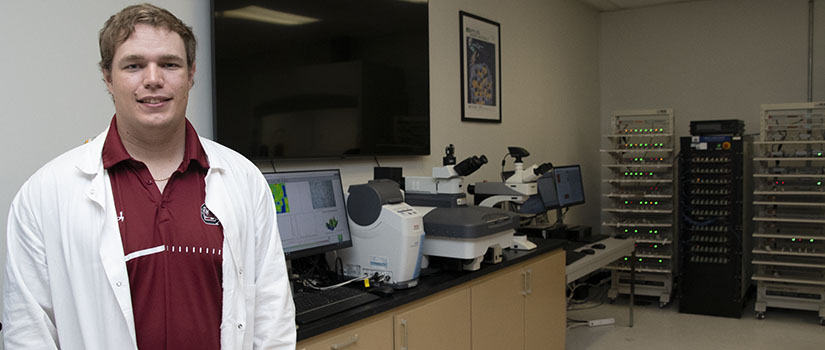Chemical engineering Ph.D. candidate Hunter McRay is tackling one of today’s biggest safety concerns: electric vehicle (EV) battery fires. With EV sales expected to increase by 27% globally by the end of this year, the need for safer, more efficient batteries is essential. McRay’s current research aims to improve energy storage systems, reducing the risks that have plagued the industry.
McRay’s journey began during the height of the COVID-19 pandemic when internships were scarce. Rather than blaming the pandemic for a lack of opportunities, McRay seized the chance to dive into research.
“I started doing undergraduate research to try and fill in the gaps," McRay says. "I was already running my own project and presenting those results, and I felt like I had control over my own work.”
McRay has continued his research in the same lab since his undergraduate years, under the mentorship of Chemical Engineering Assistant Professor Golareh Jalilvand, whom he greatly admires.
"Hunter was one of the first grad students to join my team, and he’s had a huge impact on building up our lab from scratch. We’re one of the best-equipped labs for battery research on campus, and a lot of that is thanks to Hunter," Jalilvand says. "He’s always delivering research reports and creating new knowledge in next-gen battery materials, showing off his technical skills and leadership qualities."
McRay's current research includes projects that could revolutionize the future of battery technology. He is working on improving the thermal stability of battery separators, which are membranes positioned between the positive charged anode and negatively charged cathode, to prevent dangerous malfunctions.
“The reason why batteries catch fire and eventually explode is that the separator melts,” McRay explains. “Cellulose’s melting point is higher, so it increases the thermal stability much better.”
McRay is also exploring metal doping in lithium iron phosphate materials to increase battery efficiency. Part of the process involves modifying the properties of active electrode materials. The project is in collaboration with Pomega Energy Storage Technologies, a company focused on sustainable energy solutions, which is constructing a $300 million lithium-ion battery facility in Colleton County, South Carolina.
“You've seen a lot of battery fires in recent years with electric vehicles and electric bikes. For example, the Chevy Bolt was recalled because the separator kept melting, causing a battery fire and explosion. Those polyolefin [polymer] separators melt between 130 to 160 degrees Celsius,” McRay says.
Beyond his research, McRay has been active in student organizations. He recently served as stepped down from his role as president of the Chemical Engineering Graduate Student organization at the University of South Carolina and is currently treasurer of the Electrochemical Society Student Chapter. Later this year, McRay will present at a joint international conference in Hawaii, bringing together researchers from across the Pacific Rim.
"Hunter’s growth has been amazing. He’s developed the mindset of a research engineer, and he now can design experiments that get him to his research goals quickly and reliably. Not everyone picks up that skill easily, but Hunter’s done it in a short time," Jalilvand says. "I know he’ll make a big impact in his community and the field once he graduates."
Looking toward the future, McRay is considering multiple career paths going forward. While he is interested in staying in the battery sector, he is also exploring the possibility of working at a national lab.
Through his dedication to both research and his personal passions of live music that help balance his life, McRay demonstrates a balanced and enthusiastic approach to life. His advice for undergraduates is simple.
“Try to connect early and get into what professors are doing,” McRay says. “Understanding what you’re getting into, rather than just going in blindly, is tough and stressful."
With his commitment to innovation and his openness to new experiences, McRay is poised to make a significant impact in the world of chemical engineering and battery technology.
